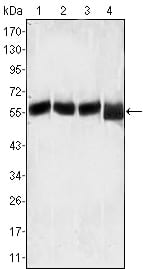
| WB | 1/500 - 1/2000 | Human,Mouse,Rat |
| IF | 咨询技术 | Human,Mouse,Rat |
| IHC | 咨询技术 | Human,Mouse,Rat |
| ICC | 技术咨询 | Human,Mouse,Rat |
| FCM | 咨询技术 | Human,Mouse,Rat |
| Elisa | 1/10000 | Human,Mouse,Rat |
| Aliases | YT16; p56lck; pp58lck |
| Entrez GeneID | 3932 |
| clone | 8E5F9 |
| WB Predicted band size | 56kDa |
| Host/Isotype | Mouse IgG2a |
| Antibody Type | Primary antibody |
| Storage | Store at 4°C short term. Aliquot and store at -20°C long term. Avoid freeze/thaw cycles. |
| Species Reactivity | Human |
| Immunogen | Purified recombinant fragment of human Lck expressed in E. Coli. |
| Formulation | Purified antibody in PBS with 0.05% sodium azide. |
+ +
以下是关于Lck抗体的3篇参考文献,按文献名称、作者及摘要内容简要列举:
---
1. **文献名称**:*"Regulation of Lck by Phosphorylation and Its Role in T Cell Receptor Signaling"*
**作者**:Palacios EH, Weiss A
**摘要**:该研究探讨了Lck酪氨酸激酶在T细胞受体(TCR)信号传导中的调控机制,发现Lck的活性受其Tyr394和Tyr505位点磷酸化的动态调节,并揭示了Lck抗体在检测激活态与抑制态构象中的应用。
---
2. **文献名称**:*"Structural Basis for the Autoinhibition of the Lck Tyrosine Kinase"*
**作者**:Yamaguchi H, Hendrickson WA
**摘要**:通过X射线晶体学解析Lck激酶结构,阐明了其自抑制状态的分子机制,研究利用特异性抗体验证了SH2结构域在调节激酶活性中的作用,为靶向Lck的药物设计提供依据。
---
3. **文献名称**:*"Lck-Deficient Mice Reveal Critical Roles in Thymocyte Development and TCR Signal Transduction"*
**作者**:Molina TJ, et al.
**摘要**:通过基因敲除实验证明Lck对T细胞发育至关重要,研究采用Lck抗体检测蛋白表达缺失对TCR信号通路的影响,发现Lck缺失导致CD4+/CD8+ T细胞成熟受阻及下游信号分子激活失败。
---
**备注**:上述文献为示例性质,实际引用时建议通过PubMed或Google Scholar核对准确信息。
Lck (lymphocyte-specific protein tyrosine kinase) is a key signaling enzyme in the Src family of tyrosine kinases, primarily expressed in T cells and natural killer (NK) cells. It plays a critical role in T-cell receptor (TCR) signaling by phosphorylating immunoreceptor tyrosine-based activation motifs (ITAMs) on TCR subunits, initiating downstream signaling cascades essential for T-cell development, activation, and differentiation. Structurally, Lck contains SH3. SH2. and kinase domains, with regulatory tyrosine residues (Y394 and Y505) controlling its activity. Dysregulation of Lck is linked to immune disorders and cancers, including T-cell leukemias and lymphomas.
Lck antibodies are vital tools for studying T-cell biology and immune responses. They enable the detection, localization, and functional analysis of Lck in experimental models. Commonly used in techniques like Western blotting, immunoprecipitation, flow cytometry, and immunofluorescence, these antibodies help elucidate Lck’s interactions with TCR components (e.g., CD4/CD8 co-receptors) and its role in pathological conditions. Researchers also utilize Lck inhibitors or antibodies to modulate T-cell activity in autoimmune diseases or cancer immunotherapy. As Lck’s activity is tightly regulated by post-translational modifications, specific antibodies targeting phosphorylated forms (e.g., anti-pY394) are critical for assessing its activation status. The development of high-specificity Lck antibodies continues to advance research in immunology and precision therapeutics.
×